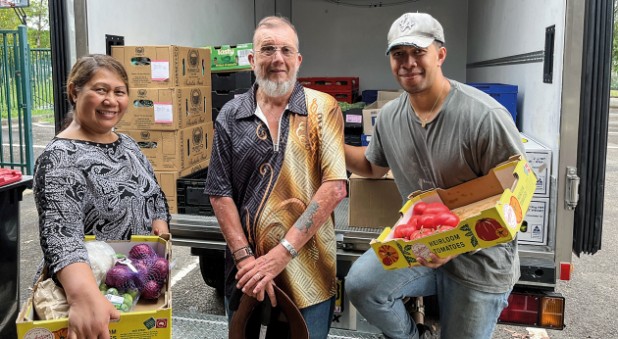A big crowd of people are huddled around tables when I arrive at St Mark’s, Sadleir. It’s a wet Tuesday morning and despite the dreary weather, they have rocked up early to wait for Anglicare’s Community Pantry truck to bring the fortnight’s affordable fresh produce and pantry staples.
While Anglicare’s food and financial support programs are not new, the increase in numbers gathering to access these services is at a level never seen before.
“There’s a lot more people waiting,” says Tai Piilua, one of Anglicare’s volunteers. After a busy morning, she is packing empty produce boxes and sorting the few remaining bunches of kale and loaves of bread. She and a small crew of volunteers travel across Sydney and the Blue Mountains delivering food.
“Normally people come one by one, but today they were waiting for us,” she says. “We are seeing that across different churches.”
In January, the ABC reported living costs had risen by 9 per cent in the year to September 2023. While figures from the Australian Bureau of Statistics revealed the true increase in household costs, many families don’t need the ABS to tell them they’re struggling.
Low-income earners are prioritising shelter above all else, resulting in things like food rationing, hunger and avoiding the use of heating in winter. Anglicare has had an increased demand for its services, with more than 20,000 bags of groceries and produce given to those in need in the past year.
I ask Sue King, the director of advocacy for Anglicare Sydney, if there has been any improvement in people’s circumstances in the nine months since the Hungry or Homeless report was published.
“Things have not improved,” she says. “People who are on very low incomes are finding it incredibly difficult... People are sacrificing in order to stay in their homes. If you’ve got a choice between maintaining rent and going without something, such as food or medication, you would always choose paying the rent as much as you can over everything else.
“Very low-income earners have less discretionary income to spend on essentials like food, medication, school supplies etc. It’s an indication of how dire things are.”
Back at Sadleir, rector the Rev Dave Morgan has seen an increase in demand for groceries – especially after Anglicare added fresh produce to its grocery service last year.
“The numbers have certainly grown at Fresh Food over the last 12 months,” he says. “I’m hearing lots of talk about the cost of living in our area, and that’s definitely a big factor in the growth of pantry numbers.”
Can Anglicare keep up with the demand? In addition to the groceries given out in 2023, more than $1 million was provided for rental assistance and $500,000 for utilities. Fifty-six churches also offer mobile community pantry services.

Above: Premier Chris Minns speaks with interviewer Justine Toh about cost of living at the Anglicare Gala DInner in May. The dinner was a fund-raiser for Anglicare’s Domestic Violence services.
With an increase in people contacting Anglicare for help, requests for support are not showing any signs of slowing, with older single women and young families at greatest risk.
“There’s always been more demand than Anglicare can meet,” Ms King says. “The number of new people who have never before accessed community support with a need for food, medication or utility bills are people who are working [but] just can’t manage. We find it’s an escalating issue. It’s not going away as long as we have the issue of rental affordability.”
In such dire circumstances, I ask Ms King what can be done to help:
Support – “Sixty per cent of funding in this space is reliant on donations. People can make a difference that way. A lot of churches have food drives that come through to our community hubs. Participating in those [really helps].”
Volunteer – “During COVID we lost a huge number of volunteers – 40-50 per cent of our force [are] volunteers in the emergency relief space.” Anglicare is looking for people who can spend a day a week, or fortnight, handing out food bags or helping talk to people at a mobile food pantry.
Look out for others – “If you see neighbours struggling, let them know Anglicare can help them with bills, utilities and food. Find your local Anglicare community hub and let those people know that we’re here to help.”
Pray
- that people in need become aware of the support services available to them and how they can be accessed
- for shifts in government policy that improves the situation for those suffering financial hardship
- that Anglicare will have enough resources to meet demand; pray for an increase in funding






















